新课标九年级英语知识点汇总 复习提纲
强力推荐 新课标新目标九年级英语单元知识点、短语及句型总结

Unit 1一、知识点1.Check in : 在旅馆的登记入住。
Check out: 在旅馆结账离开。
2.By: ①通过…..方式(途径)。
例:I learn English by listening to tapes.②在…..旁边。
例:by the window/the door③乘坐交通工具例:by bus/car④在……之前,到……为止。
例:by October在10月前⑤被例:English is spoken by many people.3.how与what的区别:how通常对方式或程度提问,意思有:怎么样如何,通常用来做状语、表语。
what通常对动作的发出者或接受者提问,意思为什么,通常做宾语,主语。
①How is your summer holiday? It’s OK.(how表示程度做表语)②How did you travel around the world? I travel by air.③What do you learn at school? I learn English, math and many other subjects.①What…think of…? How…like…?②What…do with…? How…deal with…?③What…like about…? How…like…?④What’s the weather like today? How’s the weather today?⑤What to do? How to do it?e.g. What do you think of this book?=How do you like this book?I don’what I should do with the matter.=I don’should deal with it.What do you like about China?=How do you like China?I do n’t know what to do next step?=I don’t know how to do it next step?㊣What good / bad weather it is today!(weather为不可数名词,其前不能加a )㊣What a fine / bad day it is today! (day为可数名词,其前要加 a )4. aloud, loud与loudly的用法: 三个词都与"大声"或"响亮"有关。
九年级全册英语知识点大纲
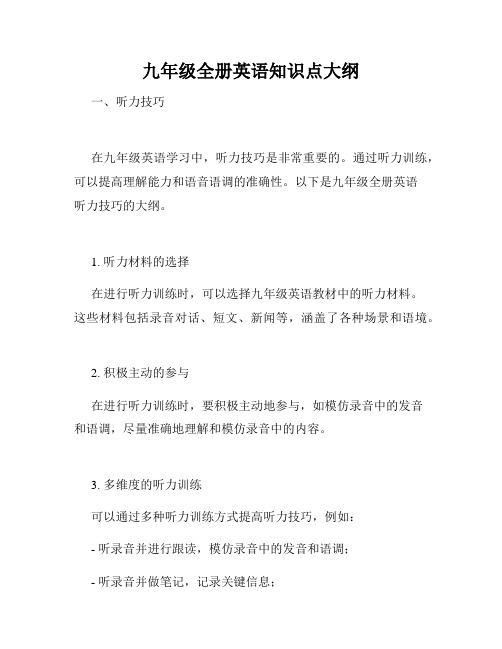
九年级全册英语知识点大纲一、听力技巧在九年级英语学习中,听力技巧是非常重要的。
通过听力训练,可以提高理解能力和语音语调的准确性。
以下是九年级全册英语听力技巧的大纲。
1. 听力材料的选择在进行听力训练时,可以选择九年级英语教材中的听力材料。
这些材料包括录音对话、短文、新闻等,涵盖了各种场景和语境。
2. 积极主动的参与在进行听力训练时,要积极主动地参与,如模仿录音中的发音和语调,尽量准确地理解和模仿录音中的内容。
3. 多维度的听力训练可以通过多种听力训练方式提高听力技巧,例如:- 听录音并进行跟读,模仿录音中的发音和语调;- 听录音并做笔记,记录关键信息;- 听录音并回答问题,检验理解水平;- 听录音并进行口头表达,提高口语表达能力。
4. 听力测试的准备在九年级的考试中,听力部分通常是重要的一部分。
为了准备听力测试,可以进行模拟考试和练习,熟悉常见的听力题型,并掌握解题技巧。
二、语法知识点九年级的英语学习中,掌握基础的语法知识是非常重要的。
以下是九年级全册英语语法知识点的大纲。
1. 动词时态- 一般现在时- 现在进行时- 一般过去时- 过去进行时- 一般将来时2. 名词- 可数名词与不可数名词- 单数名词与复数名词- 名词所有格的形式和用法3. 代词- 主格代词和宾格代词- 物主代词的形式和用法- 反身代词的形式和用法- 指示代词和疑问代词的形式和用法4. 形容词与副词- 基本形容词的比较级和最高级形式- 副词的比较级和最高级形式- 形容词和副词的修饰和位置5. 时态和语态- 过去完成时- 一般将来时的被动语态- 现在完成进行时- 情态动词的用法和语态三、词汇积累九年级的英语学习中,词汇积累是非常重要的。
以下是九年级全册英语的词汇积累大纲。
1. 拓展词汇量- 通过阅读英语文章、练习课外单词表、参加词汇竞赛等方式扩大词汇量。
- 注意词汇的词义辨析和用法。
2. 同义词和反义词- 学习常见的同义词和反义词,并能正确运用。
新课标九年级英语1-7单元提纲
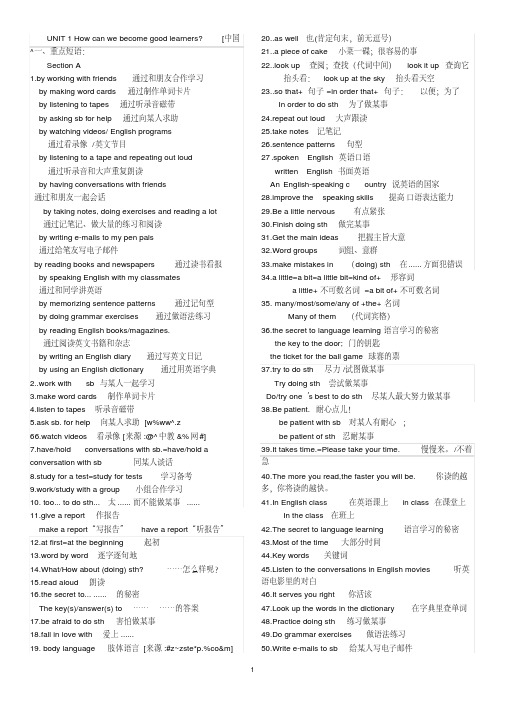
UNIT 1 How can we become good learners?[中国^一、重点短语:Section A1.by working with friends 通过和朋友合作学习by making word cards通过制作单词卡片by listening to tapes通过听录音磁带by asking sb for help通过向某人求助by watching videos/ English programs通过看录像/英文节目by listening to a tape and repeating out loud通过听录音和大声重复朗读by having conversations with friends通过和朋友一起会话by taking notes, doing exercises and reading a lot通过记笔记、做大量的练习和阅读by writing e-mails to my pen pals通过给笔友写电子邮件by reading books and newspapers 通过读书看报by speaking English with my classmates通过和同学讲英语by memorizing sentence patterns 通过记句型by doing grammar exercises 通过做语法练习by reading English books/magazines.通过阅读英文书籍和杂志by writing an English diary 通过写英文日记by using an English dictionary 通过用英语字典2..work with sb 与某人一起学习3.make word cards制作单词卡片4.listen to tapes听录音磁带5.ask sb. for help向某人求助[w%ww^.z66.watch videos看录像[来源:@^中教&%网#]7.have/hold conversations with sb.=have/hold a conversation with sb 同某人谈话8.study for a test=study for tests 学习备考9.work/study with a group 小组合作学习10. too... to do sth...太......而不能做某事......11.give a report 作报告make a report“写报告”have a report“听报告”12.at first=at the beginning 起初13.word by word逐字逐句地14.What/How about (doing) sth? ……怎么样呢?15.read aloud 朗读16.the secret to... ......的秘密The key(s)/answer(s) to…………的答案17.be afraid to do sth害怕做某事18.fall in love with爱上......19. body language 肢体语言[来源:#z~zste*p.%co&m]20..as well也(肯定句末,前无逗号)21..a piece of cake小菜一碟;很容易的事22..look up 查阅;查找(代词中间)look it up查询它抬头看:look up at the sky抬头看天空23..so that+句子=in order that+句子:以便;为了In order to do sth为了做某事24.repeat out loud大声跟读25.take notes记笔记26.sentence patterns句型27.spoken English英语口语written English书面英语An English-speaking c ountry说英语的国家28.improve the speaking skills提高口语表达能力29.Be a little nervous 有点紧张30.Finish doing sth做完某事31.Get the main ideas 把握主旨大意32.Word groups 词组、意群33.make mistakes in (doing) sth 在......方面犯错误34.a little=a bit=a little bit=kind of+形容词a little+不可数名词=a bit of+不可数名词35.many/most/some/any of +the+名词Many of them (代词宾格)36.the secret to language learning语言学习的秘密the key to the door; 门的钥匙the ticket for the ball game球赛的票37.try to do sth 尽力/试图做某事Try doing sth尝试做某事Do/try one’s best to do sth尽某人最大努力做某事38.Be patient.耐心点儿!be patient with sb对某人有耐心;be patient of sth忍耐某事39.It takes time.=Please take your time. 慢慢来。
人教版新目标九年级全一册英语语法知识点复习提纲
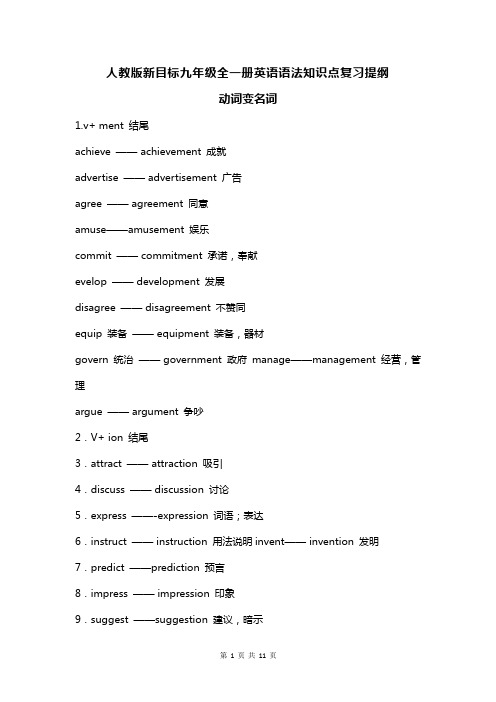
人教版新目标九年级全一册英语语法知识点复习提纲动词变名词1.v+ ment 结尾achieve —— achievement 成就advertise —— advertisement 广告agree —— agreement 同意amuse——amusement 娱乐commit —— commitment 承诺,奉献evelop —— development 发展disagree —— disagreement 不赞同equip 装备—— equipment 装备,器材govern 统治—— government 政府manage——management 经营,管理argue —— argument 争吵2.V+ ion 结尾3.attract —— attraction 吸引4.discuss —— discussion 讨论5.express ——-expression 词语;表达6.instruct —— instruction 用法说明invent—— invention 发明7.predict ——prediction 预言8.impress —— impression 印象9.suggest ——suggestion 建议,暗示10.educate —— education 教育11.graduate —— graduation 毕业12.operate —— operation 操作,动手术13.illustrate —— illustration 阐明,举例说明14.pollute —— pollution 污染15.introduce ——introduction 介绍16.organize ——organization组织17.imagine —— imagination 想象力18.inspire——inspiration 灵感,鼓舞人心的事19.invite —— invitation 邀请20.compete —— competition 竞争,比赛21.pronounce ——pronunciation发音22.admit —— admission 承认23.permit —— permission 允许24.conclude —— conclusion 结论25.decide —— decision 决定26.describe —— description描写,描绘27.resolve —— resolution 决心28.solve ——solution 解决方法3.V+ ance 结尾\1.allow —— allowance 允许2.appear —— appearance 外貌,出现3.perform —— performance 演出4.exist —— existence 存在5.V+ ing 结尾1.end —— ending 结尾,结局2.train ——training训练3.mean —— meaning 意义4.say—— saying 谚语5.remind —— reminding提醒6. bathe ——bathing沐浴6.词尾加-er或-or后变成表示“某一类人”的名词work——worker 工人7.teach——teacher老师8.sing——singer 歌手9.jump——jumper跳高运动员10.play——player表演者、运动员11.learn——learner 学习者12.visit——visitor访问者13.invent——inventor发明家7.V+ 其他8.beg——beggar 乞丐9.sit——seat 座位10.believe —— belief 信仰11.behave —— behavior 行为12.know—— knowledge 知识13.fly—— flight 飞行14.mix —— mixture 混合物15.press —— pressure 压力16.serve —— service 服务17.succeed ——success 成功18.pursue —— pursuit 追求,从事19.propose —— proposal 建议20.withdraw ——withdrawal 取钱;收回;撤退21.survive —— survival--survivor 幸存者22.arrive —— arrival到达23.analyze —— analysis 分析 2形容词变名词 1.词尾ent改为ency或ence24.efficient有效率的——efficiency 效率patient——patience/impatience 耐性/无耐心dependent——dependence依赖性independent——independence 独立性urgent——urgency 紧急25.2.ble结尾,ble改为bility26.possible—possibility 可能27.responsible—responsibility 责任;职责3.其他accurate—accuracy 准确性28.prosperous——prosperity 繁荣29.true——truth 真相30.wide——width 宽度31.long——length 长度32.high——height 高度 3名词/动词变形容词1.名词+y33.guilt 罪恶——guilty 内疚的34.health——healthy 健康的35.luck——lucky 幸运的36.cloud——cloudy 多云的37.wind—windy 多风的38.rain——rainy 多雨的39.snow——snowy 多雪的40.tourist —— touristy 游客多的er结尾,改er为ry hunger——hungry 饥饿的anger —— angry 生气的fog—— foggy 有雾的sun—— sunny 阳关灿烂的fur—— furry 毛皮的shine——shiny 发亮的taste —— tasty 美味的2.名词/动词+ ed以辅音+辅音结尾的单词,直接加edtalent —— talented 有天赋的offend ——offended 生气的crowd ——crowded 拥挤的以元音字母e结尾的单词直接加dbalance —— balanced 平衡的organize——organized 有组织的pollute ——polluted 被污染的please ——pleased 高兴的元音加辅音结尾的单词,词尾辅音双写再加edspot —— spotted 有斑点的3.名词+ ful/lesscare —— careful/ careless 小心的/ 粗心的help—— helpful / helpless 有帮助的/ 无助的use—— useful/ useless有用的/ 无用的meaning —— meaningful / meaningless有意义的/无意义的colour—— colourful /colourless多彩的/无色的pain 疼痛——painful /painless痛苦的/ 不痛的thank—— thankful / thankless 充满感激的/ 不知感恩的 peace 和平—— peaceful 和平的play游戏—— playful 爱玩耍的home —— homeless 无家可归的4.名词/动词+ able5.change —changeable 易变的6.adjust——adjustable 可调整的knowledge——knowledgeable 知识渊博的comfort—comfortable舒适的7.suit ——suitable 合适的动词以辅音加y结尾把y变i 加able ,deny—— deniable 可否认的rely—— reliable 可靠的4.名词+ ouscourage——courageous 勇敢的danger—— dangerous 危险的以y结尾,改y为i再加ousmystery 神秘—— mysterious 神秘的5.ce 变tconfidence—— confident 自信的difference——different 不同的6.dependence —— dependent 依赖他人的independence—— independent 独立的7.词尾加 aladdition—— additional 附加的,额外的music—— musical 音乐的person——personal (私人的)nation—— national 国家的education——educational有教育意义的tradition—— traditional 传统的origin起源——original 新颖的;独创的以元音字母e 结尾的单词,去掉词尾元音加al nature——natural 自然的globe—— global 全球的特例:class—— classical 经典的medicine 药——medical 医学的grammar—— grammatical 语法的8.名词+ lyfriend—— friendly 友好的live——lively 活跃的,有生气的love——lovely 可爱的week——weekly 每周的man——manly 男子气概的;强壮的9.词尾+ en10.wood—— wooden 木制的11.wool—— woolen 羊毛的10.表示方位的词11.East——eastern12.West——western13.outh——southern14.North——northern15.11.四大洲Asia 亚洲—— AsianAfrica 非洲——AfricanEurope欧洲—— EuropeanAmerica 美洲——American12.其他13.energy精力——energetic 精力充沛的strategy——strategic 战略的scientist——scientific 科学的fool 傻子——foolish 愚蠢的love——loving 慈爱的pleasure——pleasant令人愉快的/ pleased高兴的pride——proud 自豪的 4形容词变动词1.词尾加izemodern——modernize 使...现代化social——socialize 使...社会化2.词尾加enfast——fasten 使固定;集中于short—— shorten 缩短wide——widen 放宽less——lessen 使...减少特例(有变形):long——lengthen 使延长strong ——strengthen 加强;巩固3.词前加enlarge ——enlarge 扩大;放大 5形容词变副词1.形容词+ ly bad——badly 坏地bright——brightly 明亮地casual——casually 随意地cl ear——clearly 清楚地complete——completely 完全correct——correctly 正确地final——finally 最后fortunate——fortunately幸运地general——generally 一般来讲loud——loudly 大声地particular ——particularly特别地polite——politely 礼貌地proper ——properly适当地main——mainly 主要地most ——mostly 多半,大多数normal——normally 正常地quick——quickly 迅速地quiet——quietly 轻轻地,安静地real——really 真正地recent ——recently 最近;近来sad——sadly 悲哀地slow——slowly 缓慢地special——specially 专门,特殊地specific——specifically 特定地,明确地strong——strongly 坚决地,强烈地sudden——suddenly突然usual——usually 通常2.以le 结尾的,去e + yfortable——comfortably 舒服地gentle——gently 温柔地possible——possibly 可能地simple——simply 仅仅;只;简单地terrible——terribly 非常;极度地4.辅音字母+ y 变y为 ily5.easy——easily 容易地6.heavy——heavily 沉重地7.happy——happily 快乐地4.特殊good——well好地true——truly 真实地第11页共11页。
强力推荐 新课标初三英语复习提纲
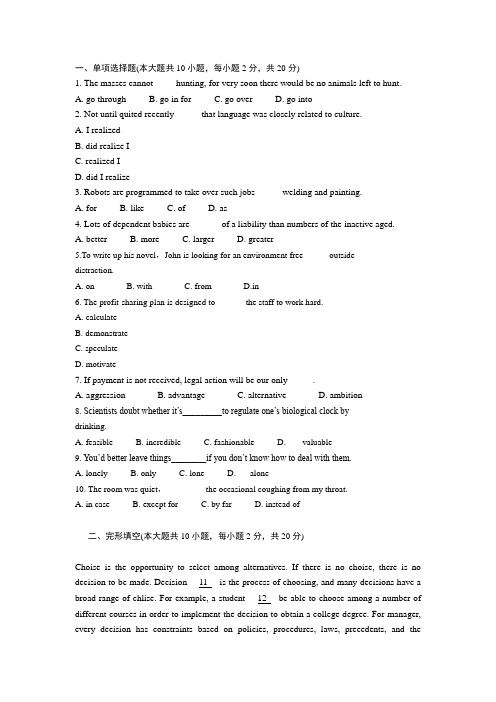
一、单项选择题(本大题共10小题,每小题2分,共20分)1. The masses cannot ____ hunting, for very soon there would be no animals left to hunt.A. go throughB. go in forC. go overD. go into2. Not until quited recently _____ that language was closely related to culture.A. I realizedB. did realize IC. realized ID. did I realize3. Robots are programmed to take over such jobs _____ welding and painting.A. forB. likeC. ofD. as4. Lots of dependent babies are ______ of a liability than numbers of the inactive aged.A. betterB. moreC. largerD. greater5.To write up his novel,John is looking for an environment free______outsidedistraction.A. onB. withC. fromD.in6. The profit-sharing plan is designed to_______the staff to work hard.A. calculateB. demonstrateC. speculateD. motivate7. If payment is not received, legal action will be our only_____ .A. aggressionB. advantageC. alternativeD. ambition8. Scientists doubt whether it’s_________to regulate one’s biological clock bydrinking.A. feasibleB. incredibleC. fashionableD. valuable9. You’d better leave things________if you don’t know how to deal with them.A. lonelyB. onlyC. loneD. alone10. The room was quiet,_________the occasional coughing from my throat.A. in caseB. except forC. by farD. instead of二、完形填空(本大题共10小题,每小题2分,共20分)Choise is the opportunity to select among alternatives. If there is no choise, there is no decision to be made. Decision __11__ is the process of choosing, and many decisions have a broad range of chlise. For example, a student __12__ be able to choose among a number of different courses in order to implement the decision to obtain a college degree. For manager, every decision has constraints based on policies, procedures, laws, precedents, and the__13__. These constraints exist __14__ all levels of the organization.Alternatives are the possible couses of action __15__ choices can be made. If there are no alternatives, there is no choice and, therefore, __16__ decision. __17__ no alternatives are seen, often it means that a thorough job of examining the problems has not been done. For example, managers sometimes __18__ problems in an either/or fashion; this is their way of simplifying complex problems. But the tendency to __19__ blinds them to other alternatives. At the managerial level, decision making includes limiting alternatives as well as identifying them, and the range is from highly limited __20__ practically unlimited.11. A. made B. making C. make D. to make12. A. must B. can C. may D. should13. A. similar B. same C. so on D. like14. A. at B. for C. on D. over15. A. among what B. between them C. of that D. from which16. A. somewhat B. some C. no D. any17. A. As B. If C. While D. Though18. A. treat B. meet C. face D. deal19. A. satisfy B. simplify C. identify D. modify20. A. before B. in C. to D. after三、阅读理解(本大题共10小题,每小题2分,共20分)Passage OneIn recent years many companies of the world have been faced with the problem of how to make their workers more productive. Some experts claim the answer is to make jobs more varied. But do more varied jobs lead to greater productivity? There is evidence to suggest that while variety certainly makes the worker’s life more enjoyable, it does not actually make him work harder. As far as increasing productivity is concerned, variety is not an important factor. Other experts feel that giving the worker freedom to do his job in his own way is important and there is no doubt that this is true. The problem is that this kind of freedom cannot easily be given in the modern factory with its complicated machines which must be used in a fixed way. Thus while freedom of choice may be important, there is usually very little that can be done to create it. Another important consideration is how much each worker contributes to the product he is making. In most factories the worker sees only one small part of the product. Some car factories are now experimenting with having many small production lines rather than one large one, so that each worker contributes more to the production of the cars on hisline. It would seem that not only is the degree of workers’ contribution an important factor, therefore, but it is also one we can do something about.To what extent does more money lead to greater productivity? The workers themselves certainly think this is important. But perhaps they want more money only because the work they do is so boring. Money just lets them enjoy their spare time more. A similar argument may explain demands for shorter working hours. Perhaps if we succeed in making their jobs more interesting, they will neither want more money, nor will shorter wirking hours be so important to them.21. The passage is mainly about how to ____.A. promote workers’ competitionB. meet worker’s need for varietyC. ensure workers’ right of choiceD. improve workers’ performance22. According to the writer, variety enables a worker to _____.A. derive more enjoyment from lifeB. work in his own way more freelyC. fulfill his job requirements betterD. undertake greater responsibilities23. We learn from the passage that freedom of choice _____.A. can hardly function in a flexible mannerB. can hardly lead to increased productivityC. is hardly seen as effective by companiesD. is hardly available in the modern factory24. It can be inferred from the passage that, compared with large production lines, smaller ones give workers ____.A. a greater variety of interesting tasksB. a stronger sense of accomplishmentC. a better idea of the modern industryD. a clearer picture of essential factors25. According to the writer, higher pay can _____.A. make tiring work more interestingB. make up for longer working hoursC. help workers to live more happilyD. help to create greater procuctivityPassage TwoQuestions 26 to 30 are based on the following passage.Doctors have long known that eating fish helps protect against heart disease. Wh at they don’t know is why fish are beneficial. For years they figured it was a simple question of substitution: folks who replace red meat with fish are naturally cutting down their intake of saturated (饱和的) fat. But a growing body of evidence collected over the past 30 years suggests fish contain healthful elements called omega-3 fatty acids.Omega-3 fatty acids belong to a group of compounds known as polyunsaturated fats. These fats serve as the raw material for a whole host of essential structures in the body, from brain cells to molecules (分子) that regulate blood pressure.Since our bodies cannot manufacture their own supply of omega-3s, we have to get them from the food we eat, mostly from fish but also from plant sources like soybeans (大豆).The American Heart Association has recommended that everyone eat two 85-g servings of fatty fish a week. But the A.H.A’s expert panel wasn’t ready to declare that taking omega-3 pills will protect your heart. It’s just too easy to get more omega-3 than you need from pills, and the panel was worried that an excess could cause serious side effects, such as internal bleeding.The U.S. Food and Drug Administration, however, allowed manufactures of omega-3 pills and fish oils to advertise the fat’s benefits—as long as the label does not suggest taking more than two grams per day.One thing is clear whether you get your omega-3s from pills, oils or fish: they are not cure-alls. You still have to eat a well-balanced diet that’s lower in total fat than most Americans currently consume. Otherwise, you’re fishing for trouble.26. Doctors have long been puzzled by .A. why red meat is harmfulB. how beneficial fish areC. what makes fish healthfulD. how red meat is replaced27. We can learn from the passage that .A. human beings get omega-3s from their foodB. omega-3s are only found in fish and soybeansC. omega-3s are the raw material for saturated fatsD. polyunsaturated fats constitute human molecules28. The A.H.A. didn’t recommend omega-3 pills, because .A. it had no knowledge of the safe dose of omega-3B. it had no evidence that they can protect the heartC. the pills contain too little omega-3 to be helpfulD. one is likely to get too much omega-3 from the pills29. The FDA allowed manufacturers of omega-3 pills and fish oils to advertise omega-3’s benefits on condition that .A. their suggested dose is printed on the labelB. their suggested dose is within the safety limitC. the fat’s potential side effects are mentionedD. the products contain side effects are mentioned30. The writer seems to suggest that .A. omega-3s can balance one’s dietB. omega-3s can serve as a supplementC. an unbalanced diet is made worse by omega-3sD. a well-balanced diet contains enough omega-3s四、词形变化(本大题共10小题,每小题2分,共20分)31. Increasingly new technology is making it __________(easy) for us to find alternative methods of testing.32. The theory of black holes in space (accept)___________ by many serious scientists and astronomers.33. If you had been in better health, we (allow)___________ you to join them in the work.34. The most _______________(convince) evidence of black holes comes from research into binary star systems.35. _______________(affect) with a serious disease, van Wendel was no longer able to speak clearly and he knew there was no hope of recovery.36. It is not yet known whether robots ____________(have) vision as good as human vision one day.37. My family _______(be) loving and supportive. They are always ready to help me.38. Every boy and girl (treat)_____________ in the same way.39. He took his umbrella with him lest it (rain)____________.40. Many other new techniques are now available that enable more research (do)__________ in the test tube to see if chemicals produce harmful biological effects.五、英译汉(本大题共1小题,每小题20分,共20分)Between labor and play stands work. A man is a worker if he is personally interested in the job which society pays him to do; what from the point of view of society is necessary labor is from his own point of view voluntary play. Whether a job is to be classified as labor or work depends, not on the job itself, but on the tastes of the individual who undertakes it. The difference does not, for example, coincide with the difference between a manual and a mental job; a gardener or a cobbler may be a worker, a bank clerk a laborer. Which a man is can be seen from his attitude toward leisure. To a worker, leisure means simply the hour he needs to relax and rest in order to work efficiently. He is therefore more likely to take too little leisurethan too much; workers die of coronaries and forget their wives’ birthdays. To the laborer, on the other hand, leisure means freedom from compulsion, so that it is natural for him to imagine that the fewer hours he has to spend laboring, and the more hours he is free to play, the better.。
强力推荐 新课标新目标九年级英语期末复习
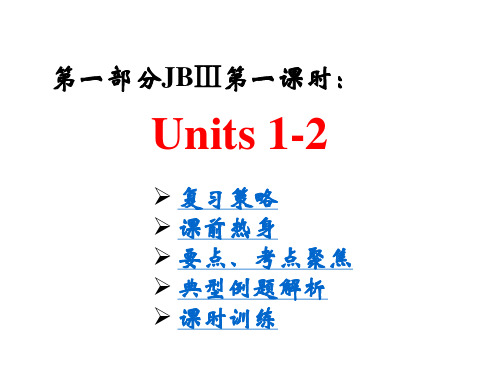
year round.
11.一位21岁的小伙子,在一年前放弃了他在旧金山图书馆的工作。
A 21 year old man, gave up his job in the San Francisco library a year ago.
12.在2001年5月17日,他13岁生日的那一天,他的梦想变成了现实。 On May 17,2001,his 13th birthday,his dream came true
要点、考点聚焦
7.What happens指发生某种事情,会怎么处理,可用一
般过去时、一般现在时、一般将来时及现在完成时。注意: happen一词不用被动语态,而另一词“take place"也作 “发生”解,但可以用于被动语态。
8.
borrow 借 对于动词的主语来说是“借进”时。 lend 借 对于动词的主语来说是“借出”时。 keep 借 指所借的东西要保留一段时间。 used to do sth.过去常常干某事,否定式结构为 “usedn't to do sth." be used to doing sth.习惯于做某事,“to”为介词。 be used to do sth.被用于做某事,为被动语态结构, “to”为动词不定式标志。
What was worse,Grandma lost more books.
4.她很着急,图书管理员也是一样。 She was worried and so was the librarian.
5.恐怕我得赔偿丢失的书了。 I'm afraid I'll have to pay for the lost books.
第一部分JBⅢ第一课时:
九年级英语知识点提纲
九年级英语知识点提纲I. 词汇知识点A. 同义词和反义词B. 常用短语和习惯用语C. 常见固定搭配D. 同源词和派生词E. 词性转换II. 语法知识点A. 时态和时态的使用B. 句型结构和句子转换C. 被动语态和主动语态D. 直接引语和间接引语E. 倒装句和强调句III. 阅读理解知识点A. 主旨大意题B. 主题句和关键词C. 推理判断题D. 细节理解题E. 词义猜测和上下文推断IV. 写作技巧知识点A. 书信写作B. 日记和记叙文写作C. 图表描述和观点阐述D. 感谢信和道歉信E. 议论文和辩论文写作V. 语音和发音知识点A. 发音规则和语调B. 重音和音节C. 音标和拼读规则D. 音素和音节判断E. 同音异义词和近义词VI. 实用口语知识点A. 问路和指路B. 购物和点餐C. 介绍自己和他人D. 问候和道歉E. 询问和表达意见VII. 非谓语动词知识点A. 不定式B. 动名词C. 现在分词和过去分词D. 动词不定式的完成时态E. 非谓语动词作宾语VIII. 时态和语态知识点A. 现在时态B. 过去时态C. 将来时态D. 完成时态E. 语态变化和语态转换IX. 连词和连接词知识点A. 并列连词B. 从属连词C. 转折连词D. 原因和结果连词E. 条件和目的连词X. 句子成分和语法结构知识点A. 主语和谓语B. 宾语和宾语补语C. 表语和状语D. 定语和状语从句E. 名词性从句和主从复合句以上是九年级英语的知识点提纲,涵盖了词汇、语法、阅读理解、写作技巧、口语、时态、语态、连词、句子成分等多个方面。
掌握这些知识点将有助于学生提高英语能力,更好地应对九年级英语考试。
通过系统地学习和巩固这些知识,相信学生们将在九年级英语学习中取得不错的成绩。
新课标英语九年级知识点
新课标英语九年级知识点从七年级到九年级,英语学科的知识点逐渐扩展和深化,九年级是整个初中英语学习的最后一个阶段。
在这个阶段,学生将学习更高级的语法规则、扩展词汇量以及各类语言技能的运用。
下面将对九年级英语知识点进行详细介绍。
1. 语法知识点1.1 时态和语态在九年级,学生需要掌握更多的时态,包括现在完成进行时、过去完成时、过去将来时等。
此外,语态也是九年级需要重点掌握的内容,包括被动语态的各种时态形式。
1.2 名词、代词和形容词的用法九年级学生需要进一步了解名词、代词和形容词的各种用法,包括复数形式、所有格、反身代词和形容词的比较级和最高级等。
1.3 各种从句的用法九年级学生需要了解和运用宾语从句、定语从句、状语从句等各种从句结构,并能准确地使用它们来构建复杂的句子。
2. 阅读理解技巧2.1 掌握阅读理解题型九年级英语阅读理解题型更加复杂,包括细节理解、推理判断、主旨概括等。
学生需要针对不同的题型采用相应的解题策略,并根据文章内容选择正确答案。
2.2 提高阅读速度和理解能力为了更好地完成阅读理解任务,九年级学生需要提高阅读速度和理解能力。
可以通过多读英文原版书籍、报纸和杂志,以及做大量的阅读理解练习来提升自己的阅读能力。
3. 写作技巧3.1 提高写作表达能力九年级学生需要逐步提高自己的写作表达能力,包括句子的结构和词汇的丰富程度。
可以通过模仿优秀的英语作文、多写多练来提高自己的写作水平。
3.2 运用逻辑连接词在写作中,逻辑连接词的运用能够使文章结构更加清晰,思路更加连贯。
九年级学生需要学会使用逻辑连接词如"however"、"therefore"等,使文章更加有条理。
4. 听力技巧4.1 锻炼听力技能九年级的听力材料将更加复杂,包括日常对话、新闻广播、演讲等。
学生需要通过多听多练,提高自己的听力技能,并能够准确地听懂和理解所听到的内容。
4.2 注意听力答题技巧九年级学生需要注意听力答题技巧,灵活运用各种答题方式,如填空、选择、对话排序等,确保准确无误地完成听力任务。
人教新目标版英语九年级全册必背单词、短语、句型(期末复习提纲)
人教新目标版英语九年级全册必背单词、短语、句型Unit 11.textbook n. 教科书;课本2.conversation n.交谈;谈话3.aloud adv.大声地;出声地4.pronunciation n.发音;读音5.sentence n.句子6.patient adj.有耐心的n.病人7.expression n.表情;表示;表达方式8.discover v.发现;发觉9.secret n.秘密adj.秘密的10.grammar n.语法11.repeat v.重复;重做12.note n.笔记v.注意13.physics n.物理;物理学14.chemistry n.化学15.memorize v.记忆;记住16.increase n. & v.增加;增长17.partner n.搭档18.born v.出生adj.天生的19.ability n.能力;才能20.create v.创造;创建21.brain n.大脑22.active adj.活跃的;积极的23.connect v.(使)连接;与……有联系24.review v.& n.回顾;复习25.knowledge n.知识26.wisely adv.明智地;聪明地Unit 227.stranger n.陌生人28.relative n.亲属;亲戚29.steal v.偷;窃取30.lay v.放置;安放;产(卵);下(蛋)31.pound n.磅;英镑32.dessert n.甜点33.garden n.花园34.tie n.领带v.捆;束35.admire v.欣赏;仰慕36.treat n.& v.招待;请客37.lie v.存在;平躺;处于38.novel n.小说39.dead adj.死的;失去生命的40.business n.生意;商业41.punish v.处罚;惩罚42.warn v.警告;告诫43.present n.现在;礼物adj.现在的44.warmth n.温暖;暖和45.spread v.传播;展开n.蔓延;传播重点短语1.pay attention to注意;关注2.connect ... with把……和……联系起来3.take notes做笔记4.have a conversation谈话5.be born with天生具有6.put on (weight)增加(体重)7.lay out展开;布置8.be similar to与……相似9.end up最终成为;最后处于10.trick or treat不招待就使坏11.Christmas Eve圣诞节前夕12.dress up盛装打扮13.not only... but also...不仅……还……14.read aloud大声读必背句型1.What about listening to tapes?听磁带怎么样?2.It's too hard to understand spoken English.理解英语口语太难了。
强力推荐 新课标人教版九年级英语复习提纲
Unit 1 重点知识讲解by doing, 通过…方式,I learn English by speaking it every day.;在。
旁边,by the lake; 乘车,by bus; 到。
时候(过完时),by the timefrustrate v. 使......沮丧;使......受挫( frustrate sb)类似还有:surprise sb, interest sb, terrify sb, frighten sb, shock sbfrustrating adj. 令人灰心的;令人沮丧的(-ing强调令人。
),如:Watching movies to learn English is frustrating because the people speak too quickly. 通过看电影来学英语是让人灰心的,因为剧中人物说话太快了。
frustrated adj. 灰心的;沮丧的(-ed 强调人自己感觉。
)如:I felt frustrated at that time. 那时,我觉得很沮丧。
类似的还有: interesting/interested; disappointing/disappointed; exciting/excited; boring/ bored; surprising/surprised; terrifying/ terrified; thrilling/thrilled; frightening/ frightened2. adj + ly= adv..如differently adv. “不同地,有区别地” quick(adj.)— quickly(adv) 动作迅速e.g. Wei Ming feels differently.different adj. be different from….(与…不同)e.g. Cars are different from buses .difference (可数名词) e.g. There are some differences between cars and buses.3. 区别:quick(adj.)— quickly(adv) 动作迅速fast (形,副) 运动速度快; soon 马上(时间快)4. add v. ①“加” e.g. Add three to six, and you get nine. 3+6=9。
- 1、下载文档前请自行甄别文档内容的完整性,平台不提供额外的编辑、内容补充、找答案等附加服务。
- 2、"仅部分预览"的文档,不可在线预览部分如存在完整性等问题,可反馈申请退款(可完整预览的文档不适用该条件!)。
- 3、如文档侵犯您的权益,请联系客服反馈,我们会尽快为您处理(人工客服工作时间:9:00-18:30)。
九年级英语知识汇总Unit11. by + doing 通过……方式如:by studying with a groupby 还可以表示:“在…旁”、“靠近”、“在…期间”、“用”,经过”、“乘车”等如:I live by the river. I have to go back by ten o’clock.The thief entered the room by the window.The student went to park by bus.2. talk about 谈论,议论,讨论The students often talk about movie after class. 学生们常常在课后讨论电影。
talk to sb. === talk with sb. 与某人说话3. 提建议的句子:①What/ how about +doing sth.? 如:What/ How about going shopping?②Why don’t you + do sth.? 如:Why don’t you go shopping?③Why not + do sth. ? 如:Why not go shopping?④Let’s + do sth.如:Let’s go shopping⑤Shall we/ I + do sth.? 如:Shall we/ I go shopping?4. a lot 许多常用于句末如:I eat a lot. 我吃了许多。
5. too…to 太…而不能常用的句型too+adj./adv. + to do sth.I’m too tired to say anything. 我太累了,什么都不想说。
6. aloud, loud与loudly的用法三个词都与"大声"或"响亮"有关。
①aloud是副词,重点在出声能让人听见,但声音不一定很大,常用在读书或说话上。
通常放在动词之后。
aloud没有比较级形式。
He read the story aloud to his son. 他朗读那篇故事给他儿子听。
②loud可作形容词或副词。
用作副词时,常与speak, talk, laugh等动词连用,多用于比较级,须放在动词之后。
She told us to speak a little louder. 她让我们说大声一点。
③loudly是副词,与loud同义,有时可替换,但往往含有令人讨厌或打扰别人的意思,可位于动词之前或之后。
He does not talk loudly or laugh loudly in public. 他不当众大声谈笑。
7. not …at all 一点也不根本不如:I like milk very much. I don’t like coffee at all.我非常喜欢牛奶。
我一点也不喜欢咖啡。
not经常可以和助动词结合在一起,at all 则放在句尾be / get excited about sth. === be / get excited about doing sth.=== be excited to do sth. 对…感兴奋如:I am / get excited about going to Beijing.===I am excited to go to Beijing. 我对去北京感到兴奋。
9. ①end up doing sth 终止做某事,结束做某事如:The party ended up singing. 晚会以唱歌而结束。
②end up with sth. 以…结束如:The party ended up with her singing. 晚会以她的歌唱而告终。
10. first of all 首先. to begin with 一开始 later on 后来、随后11. also 也、而且(用于肯定句)常在句子的中间either 也(用于否定句)常在句末too 也(用于肯定句) 常在句末12. make mistakes 犯错如:I often make mistakes. 我经常犯错。
make a mistake 犯一个错误如:I have made a mistake. 我已经犯了一个错误。
13. laugh at sb. 笑话;取笑(某人)如:Don’t laugh at me!不要取笑我!14. take notes 做笔记,做记录15. enjoy doing sth . 喜欢做…乐意做… 如:She enjoys playing football. 她喜欢踢足球。
enjoy oneself 过得愉快如:He enjoyed himself. 他过得愉快。
16. native speaker 说本族语的人17. make up 组成、构成18. one of +(the+ 形容词最高级)+名词复数形式最…其中之一如:She is one of the most popular teachers. 她是最受欢迎的教师之一。
19. It’s +形容词+(for sb. ) to do sth. (对于某人来说)做某事…如:It’s difficult (for me ) to study English.对于我来说学习英语太难了。
句中的it 是形式主语,真正的主语是to study English20. practice doing 练习做某事She often practice speaking English. 她经常练习说英语。
21. decide to do sth. 决定做某事如:LiLei has decided to go to BeiJing . 李雷已经决定去北京。
22. unless 假如不,除非引导条件状语从句如:You will fail unless you work hard..假如你不努力你会失败。
I won’t write unless he writes first. 除非他先写要不我不写23. deal with 处理如:I dealt with a lot of problem.24. worry about sb./ sth. 担心某人/ 某事如:Mother worried about his son just now. 妈妈刚才担心他的儿子。
25. be angry with sb. 对某人生气如:I was angry with her. 我对她生气。
26. perhaps === maybe 也许27. go by (时间) 过去如:Two years went by. 两年过去了。
28. see sb. / sth. doing 看见某人正在做某事强调正在发生see sb. / sth. do 看见某人在做某事如:She saw him drawing a picture in the classroom. 她看见他正在教室里画画。
29. each other 彼此30. regard… as … 把…看作为….如:The boys regarded Anna as a fool. 这些男孩把安娜看成傻瓜。
31. too many许多修饰可数名词如:too many girlstoo much许多修饰不可数名词如:too much milkmuch too太修饰形容词如:much too beautiful32. change…into…将…变为…如:The magician changed the pen into a book. 这个魔术师将这本书变为一本书。
33. with the help of sb. == with one’s help 在某人的帮助下如:with the help of LiL ei == with LiLei’s help 在李雷的帮助下34. compare … to …把…与…相比如:Compare you to Anna, you are lucky.你和安娜相比,你是幸运的。
35. instead 代替用在句末,副词(字面上常不译出来)instead of sth. / doing sth. 代替,而不是用在句中,动词如:Last summer I went to Beijing. This year I’m going to Shangh ai instead.去年夏天我去北京, 今年我将要去上海。
I will go instead of you. 我将代替你去。
He stayed at home instead of going swimming. 他呆在家里而不是去游泳。
Unit21. used to do sth. 过去常常做某事否定形式:didn’t use to do sth. / used not to do sth.如:He used to play football after school. 放学后他过去常常踢足球。
Did he use to play football? Yes, I did. No, I didn’t.He didn’t use to smoke. 他过去不吸烟。
2. 反意疑问句①肯定陈述句+否定提问如:Lily is a student, isn’t she?Lily will go to China, won’t she?②否定陈述句+肯定提问如:She doesn’t c ome from China, does she?You haven’t finished homework, have you?③提问部分用代词而不用名词Lily is a student, isn’t she?④陈述句中含有否定意义的词,如:little, few, never, nothing, hardly等。
其反意疑问句用肯定式。
如:He knows little English, does he?他一点也不懂英语,不是吗?They hardly understood it, did they?他们几乎不明白,不是吗?3. play the piano弹钢琴4. ①be interested in sth. 对…感兴趣②be interested in doing sth. 对做…感兴趣如:He is interested in math, but he isn’t interested in speakingEnglish. 他对数学感兴趣,但是他对说英语不感兴趣。
5. interested adj. 感兴趣的,指人对某事物感兴趣,往往主语是人interesting adj.有趣的,指某事物/某人具有趣味,主语往往是物6. still 仍然,还用在be动词的后面如:I’m still a student.用在行为动词的前面如:I still love him.7. the dark 天黑,晚上,黑暗8. 害怕…be terrified of sth. 如:I am terrified of the dog.be terrified of doing sth. 如:I am terrified of speaking.9. on 副词,表示(电灯、电视、机械等)在运转中/打开,其反义词off.with the light on 灯开着10. walk to somewhere 步行到某处walk to school 步行到学校11.spend 动词,表示“花费金钱、时间”①spend…on sth. 在某事上花费(金钱、时间)②spend…doing sth. 花费(金钱、时间)去做某事如:He spends too much time on clothes. 他花费太多的时间在衣着He spend 3 months building the bridge.他花费了三个月去建这座桥。
